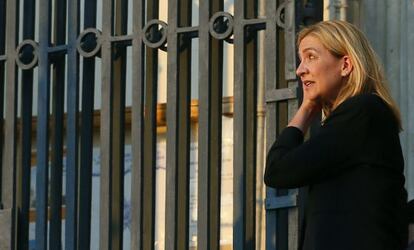Spain’s King Felipe strips sister Cristina of title of duchess of Palma
The ‘infanta’ has been embroiled in an embezzlement scandal involving her husband Royal sources say “the decision to renounce succession rights” is still in her hands

A new royal controversy has erupted over Cristina de Borbón, King Felipe VI’s younger sister, who will soon stand trial for tax fraud in connection with the so-called Nóos case.
Spain’s Official Gazette, published in the early hours of Friday morning, states that the monarch has stripped his sister of the title of Duchess of Palma, which she held since 1997 when she married the former Olympic handball player Iñaki Urdangarin.
But the princess’s lawyer, Miquel Roca I Junyent, claimed just a few hours later that it was Cristina de Borbón who had renounced the nobility title in a letter written in June.
Her husband, once an admired figure within the royal family, has since become a major suspect in an embezzlement case involving no-bid contracts
Sources at the Royal Palace cast doubt on this version of events. “The renunciation letter arrived by fax yesterday, after the king informed Cristina of his decision to take away her title,” said a source.

Urdangarin, once an admired figure within the royal family, has since become a major suspect in an embezzlement case involving no-bid contracts awarded to his Nóos Institute by the regional governments of Valencia and the Balearic Islands.
His wife Cristina – known as the ‘infanta’ – found herself embroiled in the case through her joint ownership of a company that allegedly served to receive the ill-gotten funds. She also allegedly used company credit cards to make personal purchases, then claimed tax deductions.
For the more than three years since she became a target of the court investigation, Cristina has refused to give up her succession rights to the throne
For more than three years, since before she became a formal target of the court investigation, Cristina has refused to give up her succession rights to the throne, even if these are more theoretical than real.
Her father Juan Carlos, then her brother Felipe – who accessed the throne a year ago – have been asking her to take this symbolic step as a way to improve the royal family’s image. Juan Carlos himself stepped down at a time of unprecedented low popularity for the institution marked by street protests by supporters of turning Spain into a republic.
Sources from the royal household claim “the decision to renounce the rights of dynastic succession continue to be in the hands” of the infanta.
King Felipe reportedly telephoned Cristina to inform her of his royal decree stripping her of her noble title, ahead of its publication in the Official Gazette.
The case has been surrounded by controversy, and led to a public falling out between Judge Castro and his anti-corruption attorney
On February 8, 2014, Cristina de Borbón became the first member of Spain’s royal family to testify in court as a target of a criminal investigation. Palma de Mallorca Judge José Castro asked the princess around 400 questions during her more than six-hour appearance in his courtroom, to which she answered “I don’t know” 182 times.
The case against the Spanish Infanta has itself been surrounded by controversy, and led to a public falling out between Judge Castro and his anti-corruption attorney Pedro Horrach. The latter has held that there is no hard evidence to put Cristina de Borbón on trial, and suggested that she is being persecuted for who she is, rather than for what she has done.
The judge, on the other hand, claims that putting the princess on the stand proves that everybody is equal before the law, regardless of their royal background.
Tu suscripción se está usando en otro dispositivo
¿Quieres añadir otro usuario a tu suscripción?
Si continúas leyendo en este dispositivo, no se podrá leer en el otro.
FlechaTu suscripción se está usando en otro dispositivo y solo puedes acceder a EL PAÍS desde un dispositivo a la vez.
Si quieres compartir tu cuenta, cambia tu suscripción a la modalidad Premium, así podrás añadir otro usuario. Cada uno accederá con su propia cuenta de email, lo que os permitirá personalizar vuestra experiencia en EL PAÍS.
¿Tienes una suscripción de empresa? Accede aquí para contratar más cuentas.
En el caso de no saber quién está usando tu cuenta, te recomendamos cambiar tu contraseña aquí.
Si decides continuar compartiendo tu cuenta, este mensaje se mostrará en tu dispositivo y en el de la otra persona que está usando tu cuenta de forma indefinida, afectando a tu experiencia de lectura. Puedes consultar aquí los términos y condiciones de la suscripción digital.









































